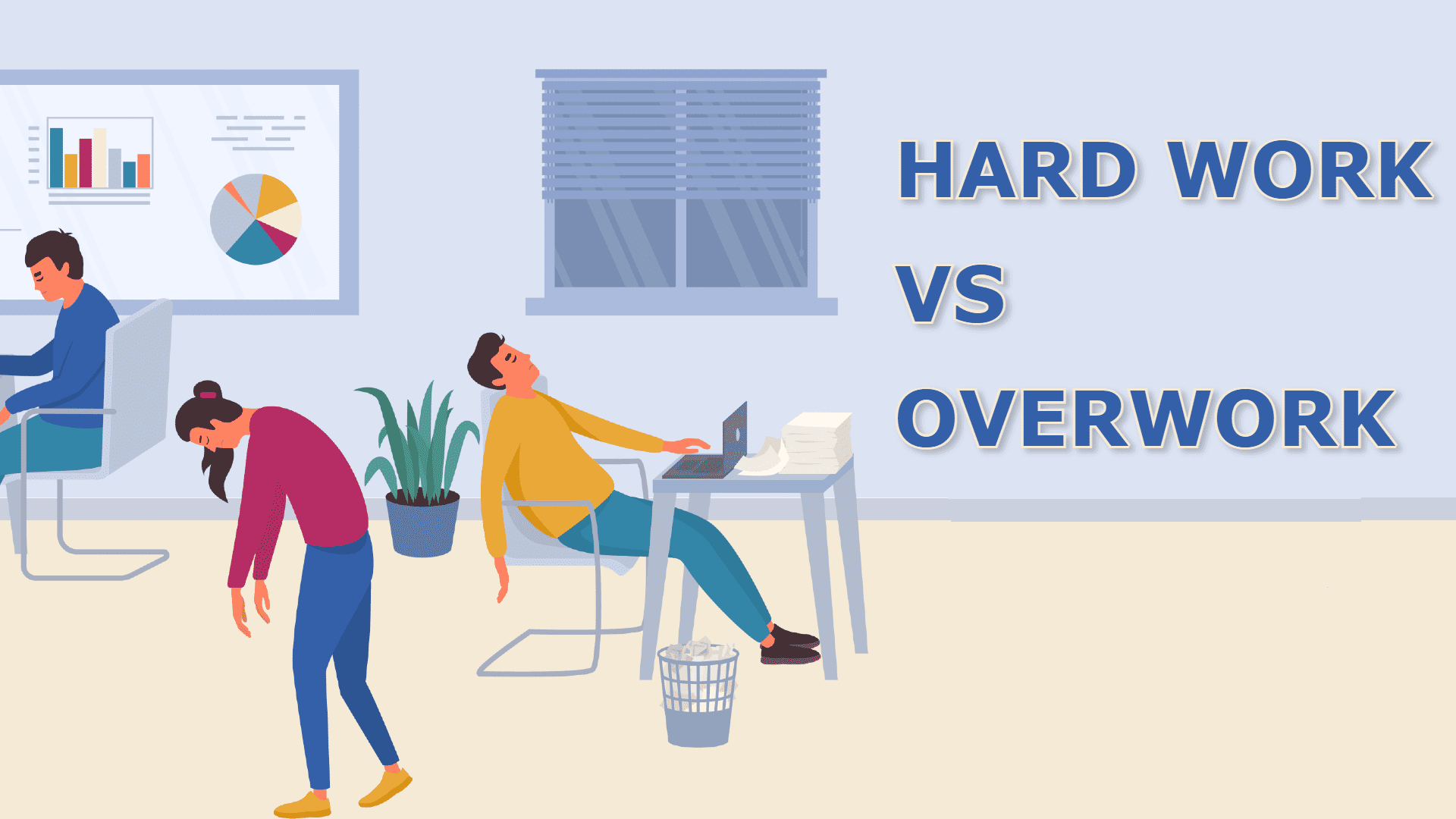Most of professional enjoy the hard work but it’s important to know Hard work vs Overwork. Be aware when hard work crosses the line and becomes overwork. Our daily routine via repetitive cycle in some sense so squeezing few days does have worse ripple effect on other days, Best strategy is how to maintain optimal hard work that can be maintained without any bad effect on regular productivity or future capabilities.
Hard work vs Overwork:
Slog hours due to some emergency situation or unplanned work is fine but this can’t be regular routine and shouldn’t be regular routine. Ultimately it would have negative net outcome over long period.
You’re a proven leader. You take pride in your ability to empower your team and give credit to their strengths. In turn, you expect great performance. Are you encouraging them to do their best, or are they causing them to give up? You may need to have empathy and insight in order to know the difference. Overwork can have a negative effect on retention, quality, productivity, and bottom line.
Each Employee is Different
Your people should be treated as individuals and not as a single entity. One employee may be able to handle almost any amount of work if they are treated well, respected and valued. Multipart task instructions can overwhelm another employee.
You should be alert for signs that employees may be stressed or confused. It is possible to prevent burnout by breaking down large tasks into smaller parts and assigning workers to work that suits their strengths.
How to Identify its Overwork ?
Employees who are not motivated, disengaged or enjoying their work will be common. While there are a few jobs that are not all fun, most people will feel satisfaction when they complete their tasks and have a sense of accomplishment. Overwork is a common cause of burnout. Nearly every employee who is physically and mentally fit can rise to the occasion, even if it means working late or long hours.
Employee Burnout, Avoid it at best
According to the World Health Organization (WHO), burnout is an occupational condition that results in chronic workplace stress that has not been managed. Burnout in employees can manifest as low energy, exhaustion, feelings of depression, anxiety, and a decreased professional efficacy. It can also impact employees’ mental and physical health.
Consequences of Overwork
Overworking your employees can have a negative impact on their physical and mental health as well as productivity and employee morale.
Great Risk of Suffering:
A meta-analysis of multiple studies has shown that workers who work long hours are at greater risk of suffering strokes than employees who work standard hours. There are other physical problems that can occur, including muscle pain, headaches, shortness of breath, and muscle pain. More people are prone to accidents, sickness, emotional dysregulation, or making mistakes.
Decreased Productivity
Studies have shown that working more than 55 hours per work week can lead to increased health problems, decreased productivity, and higher alcohol consumption. This can lead to high levels of sick days, increased turnover, higher health insurance costs, and an increase in employment expenses.
Makes People Anxious
Productivity increases with more hours worked. Each employee needs to be able to recover as their work hours increase. The lack of a chance to recharge and rejuvenate can lead to exhaustion that hinders productivity and makes people anxious. It’s easy to mistakenly identify overwork as stress. However, it is easily manageable.
Employers can’t detect any difference in the productivity of employees who work less than 80 hours per week, as opposed to those who say they do.
Inadequate Sleep
Overworking can make it difficult to get enough sleep. Only 1-3% can live on five to six hours a day. Inadequate sleep can affect performance, productivity, decision-making, and overall performance. These issues can also pose safety and health risks.
The Pandemic Effect
The pandemic has led to an increase in employee burnout. SHRM’s May 2020 survey found that 41% of employees felt burnt out by the stress of managing the COVID-19 pandemic. This is in contrast to the Gallup survey of January 2020 which showed that only 23% of employees experienced symptoms of burnout. Are you setting unrealistic expectations or encouraging your staff to do their best?
How to find You’re Overworking Your Team?
There is a fine line between asking employees to work hard and overworking them. These are signs that you might have gone too far.
- Employees work late at night, weekends, or early in the mornings.
- Employees are more impatient, frustrated, or emotional. Overwork could be the reason why rational team members become more on edge than usual.
- Some employees skip important family commitments because they don’t feel like they have the time.
- The result is that mistakes increase and productivity decreases. This is why 19th century factory owners started to restrict work hours. The owners discovered that limiting work hours led to increased output and decreased the risk of costly mistakes and accidents. It is a waste of time to make mistakes.
- Accidents at work are on the rise. They can cause injury to themselves or endanger employees. Employee morale plummets when there are lost time accidents.
These signs could indicate that your staff is overworked. You may even be driving talented workers away. High performers are most at risk of job burnout due to their extraordinary ability and dedication.
While it is reasonable to ask employees for overtime occasionally, you should also consider whether they are constantly juggling too many tasks and take steps to rectify the situation.
How to handle Overwork condition ?
Employers should not be overworked. Make work-life balance a priority. While overtime pay may seem attractive, it does have its limitations. These productivity tips are for managers and offer ways to decrease overwork and keep employees healthy and happy.
Encourage employees to take time off. American workers may not get the same time off as their counterparts in other countries, but they often feel guilty about taking the time, which can lead to lost hours. Take vacations and don’t skip lunch.
Cross-train employees. It shouldn’t be stressful to take time off. It shouldn’t feel like punishment to return from vacation. If someone is absent from work for any reason they should feel confident that someone will take care of their work, and not worry about it piling up.
Adjusting staffing levels can help you save money. It may be time for you to hire if long hours, weekends work, and excessive hours are a part of your business. To reduce the risk of staffing shortages, you can hire temporary or contract workers to fill in the gaps. This is a risk-free method to increase productivity.
Appreciate employees who are unable to do more for you, such as for a project, sudden demand or unpredicted crisis. Give out prizes, offer comp time, pay lunch, and buy lunch. Employees will feel more connected and engaged when they are part of the same team.
Conclusion:
Encourage employee professional development. Let employees know that hard work pays off. It can increase motivation and job satisfaction if employees are motivated to achieve a goal and feel supported as they progress in their careers.
Akscellence can help you find cost-effective ways to reduce overwork. We will work with you to create a solution that is both efficient and affordable. This will ensure your employees are happy and performing at their best.




